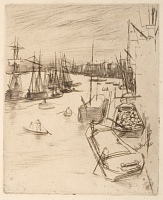The Little Rotherhithe | ||
| Number: | 74 | |
| Date: | 1861 | |
| Medium: | etching and drypoint | |
| Size: | 125 x 102 mm | |
| Signed: | 'Whistler.' at lower right | |
| Inscribed: | '1861.' at lower right | |
| Set/Publication: | no | |
| No. of States: | 4 | |
| Known impressions: | 15 | |
| Catalogues: | K.73; M.72; T.49; W.71 | |
| Impressions taken from this plate (15) | ||
TECHNIQUE
The main composition was etched, but reflections, shading on the ships, the sky and water were added in drypoint, which faded and was restored as printing continued.
PRINTING
Impressions of The Little Rotherhithe were printed both in black and dark brown ink. The first state impression was printed in black ink on Asian laid tissue ( ), and the second in dark brown ink on ivory Japanese tissue laid down on wove paper (chine collé) (
), and the second in dark brown ink on ivory Japanese tissue laid down on wove paper (chine collé) ( ). Impressions of the third state are printed in black ink on Japan laid paper (
). Impressions of the third state are printed in black ink on Japan laid paper ( ), ivory laid (
), ivory laid ( ) and off-white wove (
) and off-white wove ( ) papers. There is a slightly larger print run of the fourth state printed in black ink on Japanese paper (
) papers. There is a slightly larger print run of the fourth state printed in black ink on Japanese paper ( ), in brown on ivory laid (
), in brown on ivory laid ( ) and in both black and dark brown on laid paper with the Arms of Amsterdam watermark (
) and in both black and dark brown on laid paper with the Arms of Amsterdam watermark ( ,
,  ).
).
 ), and the second in dark brown ink on ivory Japanese tissue laid down on wove paper (chine collé) (
), and the second in dark brown ink on ivory Japanese tissue laid down on wove paper (chine collé) ( ). Impressions of the third state are printed in black ink on Japan laid paper (
). Impressions of the third state are printed in black ink on Japan laid paper ( ), ivory laid (
), ivory laid ( ) and off-white wove (
) and off-white wove ( ) papers. There is a slightly larger print run of the fourth state printed in black ink on Japanese paper (
) papers. There is a slightly larger print run of the fourth state printed in black ink on Japanese paper ( ), in brown on ivory laid (
), in brown on ivory laid ( ) and in both black and dark brown on laid paper with the Arms of Amsterdam watermark (
) and in both black and dark brown on laid paper with the Arms of Amsterdam watermark ( ,
,  ).
). Although it is usually assumed that most impressions of The Little Rotherhithe were printed between 1861 and 1863, Whistler printed one impression of the fourth state on 23 December 1877. It was printed in black ink on dark ivory laid paper with the watermark of a coat of arms with a lion and unicorn under a crown. It is a good impression with drypoint, and uses some retroussage to enhance the lines. It is possible therefore that other impressions of the final state, such as one acquired by Henry Harper Benedict (1844-1935), were printed at that time ( ).
).
 ).
).
